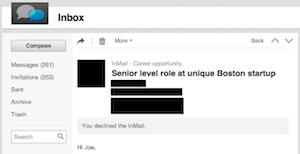
But recruiting, like any profession, has a performance bell curve: the great ones are really good, the worst are really bad, and most are in between. When you are a candidate, a great recruiter has the potential to facilitate you finding just the right company and/or opportunity. But a bad one will likely have you heading back on the market in less than 18 months.
So as a technical professional in a hot Boston job market, how can you tell the good from the bad recruiters? Here are my Top 5 Ways To Know If Your Recruiter Sucks.
#5: Transaction-Driven
The best recruiters build long term professional relationships with entrepreneurs, hiring managers and technical professionals. Their success is based on fostering repeat customers. The worst recruiters rarely work with the same hiring manager / candidate twice, and instead focus on moving resumes as fast as possible between interested parties. Their business is based on keeping a steady volume of unsuspecting candidates and companies (a.k.a. fresh meat) coming in the door.
Qualifying question: Can you tell me the names of 2-3 hiring managers and/or candidates you’ve worked with more than once? Can you introduce me to them?
#4: It’s Just a Job
The best recruiters have a personal and professional interest in what is happening in Boston technology. In telling you about an opportunity, they are likely to tell the story of the key people in the company, their backgrounds, and their successes. For a bad recruiter, working in technology in Boston is just a job. The closest they come to the tech community is by occasionally organizing social gatherings for technologists for the transparent purpose of lead generation (a.k.a. finding fresh meat).
Qualifying question: Who are the top leaders and/or technologists in Boston today and why?
#3: Fast Over Right
I’m always amazed at recruiters who push candidates to spend 2-3 weeks looking at jobs before taking the best of the available offers. If you’re seeking a job to make you professionally, financially and/or personally happy, you likely value right over fast. Good recruiters won’t be in a rush, since they represent quality candidates / companies, and so know the deals will close sooner or later. But bad recruiters need to sell their goods like stock traders at the start of a bust. Their best technique is the age old sales techniques for closing a deal: creating a sense of urgency. For bad recruiters, it’s about fast over right.
Qualifying question: Tell me about someone you worked really hard for to find the right opportunity? How long did it take and why?
#2: Used Car Salesman
Bad recruiters all share one trait: they over sell. I can’t tell you how many times I’ve been told about a fantastically accomplished “rock star engineer”, only to find they are at best average. They equally over-sell the companies they represent, artificially pumping up the companies most likely to hire a candidate quickly over those that might take longer but could be a better fit for a candidate.
Qualifying question: Can you tell me some examples of how you choose the hiring companies to work with? How do you match the right company with the right candidate?
#1: Lack of Professionalism
Good recruiters will bring professionalism and discretion to their job. They don’t call up a hiring manager at a new company to tell them about a “rock star engineer” who almost certainly has not authorized them to use their background for lead generation. They also don’t carpet bomb specific companies or teams with a flurry of boilerplate InMail / email. And they don’t disparage other local people or companies in representing their candidates / clients.
Qualifying question: Why do top hiring managers / technical candidates like to work with you?
Closing Words
As a hiring manager, I don’t ever want great engineers to use a recruiter (note: the rest of you, please go ahead). I’d rather you spend the time to learn about me, my company, and my team, and then reach out to me with a request to learn more. But as long as there is at least one great engineer who lacks the time, interest and/or skills to do this, there will be a market for recruiters. So if you are going to use a recruiter, please, please, please... use a good one.
